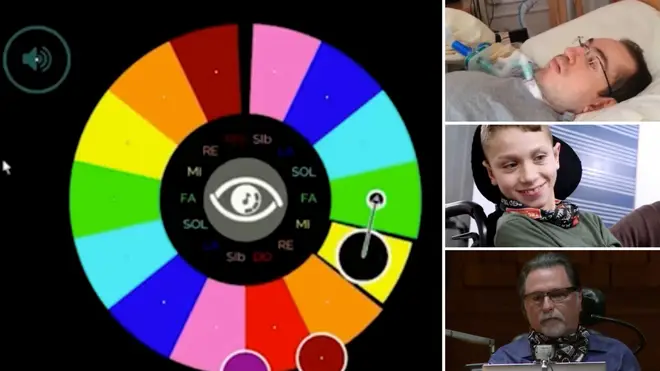On Air Now
Calm Classics with Myleene Klass 10pm - 1am
25 January 2022, 16:50 | Updated: 25 January 2022, 17:35

Innovations in music technology have allowed people with disabilities to learn and play music without barriers.
According to an Arts Council England study, just 1.8 percent of professionals in the music industry identify as being disabled. This contrasts bleakly to the almost 19 percent of the UK workforce who are considered disabled under the 2010 Equality Act.
This is unsurprising when a career in the music industry has historically been seen as inaccessible for disabled people.
Networking events, the stages themselves, and even instruments remain problematic hurdles for this community.
But what if you had an instrument you didn’t need to pick up? An instrument that you could play, just by looking at it...
Here are just some examples of the technological advancements which have strived to make music making accessible for everyone.
Read more: Extraordinary virtuoso Felix Klieser plays the French horn with his left foot

Eye Harp technology seen in performance at charity concert
Development of this groundbreaking modern music technology started in 2010, when Zacharías Vamvakousis, a musician and software developer, was studying for his Master’s degree in Sound and Music computing at Universitat Pompeu Fabra in Barcelona.
A musician friend of Vamvakousis was involved in a serious motorcycle accident, and it was unclear if he would be able to play music ever again. Realising that there was no musical instrument accessible for quadriplegic people at this time, Vamvakousis began developing the EyeHarp.
The instrument is specifically designed so those who are diagnosed with conditions such as cerebral palsy, amyotrophic lateral sclerosis, muscular dystrophy, amputation of an upper limb, or spinal cord injury can learn and enjoy playing music with their eyes. It is also suitable for people with intellectual disabilities.
In 2019, the project developed their social responsibility arm with the creation of the EyeHarp Association; a non-profit social company, whose mission is to improve the quality of life of people with disabilities, giving them access to all the benefits musical education has to offer (improving language and memory, developing creativity, raising self-esteem, and more).
Read more: This wonderful orchestra proves how classical music can adopt the Social Model of Disability

Antonio shows how Eye Harp device works
The EyeHarp is the only instrument that can be played using just the performer’s eyes. The instrument was created to give full access to musical education for a group of people who until recently, had a very limited access to playing music.
To play the EyeHarp, musicians have to simply install the software, and use this with an eye tracker camera. Then by looking at the notes on the screen, illustrated by a colourful pie-chart like circle, performers can create beautiful music.
Designed with musicality in mind, the EyeHarp offers the “same expressive qualities as any traditional instrument”.
And in order to promote accessibility to music-making, the basic version of the EyeHarp can be downloaded for free, with other pricing options available for the full version.
Read more: There’s a new Irish orchestra for disabled children

Closing Ceremony of the London 2012 Paralympic Games
In 2012, the Closing Ceremony of the London Paralympic Games included a performance of the British Paraorchestra – the world’s first professional ensemble of disabled musicians.
Since this performance, the UK has seen the creation of disabled-led youth orchestras, both regional and national.
The first of its kind, ‘National Open Youth Orchestra’, was founded in 2018 by Bristol-based OpenUp Music which helps to “transform music-making for young disabled people nationwide”.
The orchestra supports 11- to 25-year-old disabled and non-disabled musicians to rehearse and perform together as members of a pioneering inclusive ensemble. As well as acoustic instruments, members can also make music using the ‘Clarion’.
The Clarion can be played with any movement of the body, including the eyes.
Our trainee Sherwin joined the Bristol Training Centre rehearsal on Saturday @BPMbristol #NCIE #BristolMusicTrust. He and George play the Clarion from @openupmusic using head movements #ExpressiveAccessibleInstrument #MusicalPotential. First time playing together 🚀 pic.twitter.com/x3OECeHgZz
— National Open Youth Orchestra (@theNOYO) January 22, 2019
Matt Griffiths, CEO of Youth Music (which funds Open Up Music) told ClassicFM.com: “Digital technology is integral to music and indeed in wider music education. It often has an even greater role in supporting disabled musicians.
“We have seen some positive innovations in assistive music technology in the UK particularly over the last ten years including the Clarion developed by Open Up Music and the work of Drake Music.”
While these positive innovations have been seen in the UK and abroad, they are notably attached to universities in developed countries, and Griffiths suggests that there is still a way to go until music-making is accessible to all.
He adds: “The challenge is to now get these technologies mainstreamed, available at scale, at affordable cost with increased knowledge across the workforce on how to use them effectively.
“This will ensure greater equity in music-making particularly for disabled musicians and others who all too often face barriers to access.”